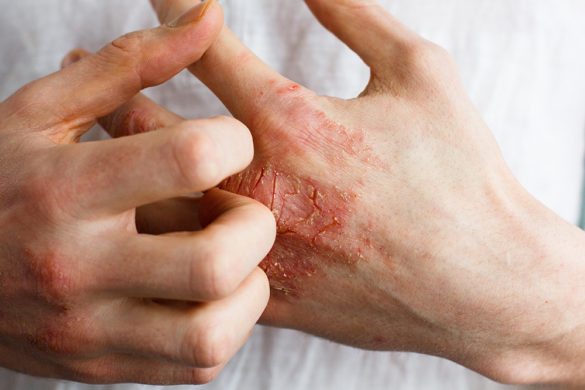
As professional dermatologists, this is often a question we get asked when consulting with clients who have eczema. Unfortunately, it’s a challenging one to answer, as the causes of eczema are not totally understood. The most useful bit of information for patients to know is that eczemas are fundamentally of 2 types – internal and external. The external is frequently subdivided into allergic and irritant which are both clinically and pathologically very different. This tends to be complicated by the fact that eczema patients can suffer from both types either at the same time or at different times.
We do know the itchy, red, dry, and uncomfortable skin condition that is eczema is not contagious. As to whether eczema is caused by an allergic reaction; this is also unlikely as the majority of eczema flares (over 50%) are ‘internal’, and not related to any outside cause. However, all patients with known internal eczema, retain a greater tendency (compared to non-eczema patients) to ALSO suffer from allergic triggers of eczemas
Research suggests that eczema is triggered by an overactive immune system. If you have eczema, you’ll understanding how frustrating, embarrassing, and sometimes painful an eczema flare up can be. This can occur if your skin is exposed to external irritants or substances, but most frequently occurs under a rhythm of its own with nothing you might have done to cause it. Many patients will find a temporal relationship between a flare and an exposure and falsely feel that eczema is the fault of an allergy or irritant.
Other factors that can impact the cause of eczema include genetics, with eczema often running in families.
What can trigger eczema – Truths and Myths
It’s important to understand that these triggers are not the cause of eczema. Triggers will produce an eczema flare up or make existing eczema worse.
- Certain foods and food allergies including dairy and nuts – Mostly myth. Food allergies can cause certain skin and breathing reactions, but these are not eczematous. They fall under a category called urticaria and angioedema.
- Chemicals or preservatives within washing detergents, cleansers, soaps, shower gels and cleaning products – Mostly myth. A relative minority of eczema patients have true allergy to the components of such products. It is well recognised and an expert can help identify if you would benefit from further allergy testing.
- Scented products, from perfume and deodorants to make up and skincare cosmetics – Mostly true. People who do have a genuine allergy to fragrances do find that upon avoiding the precise fragrance, their eczema improves but does not disappear.
- Cigarette smoke. – Mostly myth. Cigarette smoke contains potential allergens which only a very small proportion of individuals display allergy to.
- Material, both synthetic fibers such as polyester or rayon and natural fibers like wool. – Partly myth. Certain materials (silk) simply feel better against dry and inflamed skin compared to other materials.
- Temperature changes, for example going from outdoors to inside, or sweating. True – Although not a cause, the way eczematous skin reacts to temperature and humidity changes produces the unpleasant symptoms of itch, redness, and dryness
- Feeling stressed, worried, or anxious. Strangely true – the mechanism if this connection is a complete mystery but strong research points to a significant relationship between psychological stress and eczema flares.
- Upper respiratory infections, colds, flu, or a bacterial infection. True – especially in children. Look out other stressors like teething, starting school, new routines.
Research suggests that skin in eczema sufferers lacks the normal natural oil supply and retention mechanism which helps the skin to stay moisturised and healthy. Therefore, too much water on the skin, having showers or baths that are too hot, living in a dry climate, or simply being too hot or too cold can increase the skin’s dryness or sensitivity and cause an eczema flare up.
It is common for many people suffering with eczema to report that their symptoms get worse at night. This can make it difficult to sleep, and scratching eczema further irritates and inflames the skin.
As dermatologists, we can help to identify the correct treatment for your eczema, depending on the severity and type of eczema. Despite the cause remaining elusive, it is now very positive that so many more treatments exist that can offer excellent control and remission of eczema over many months.
If you, or a member of your family have eczema and would like further advice and information on eczema treatments, talk to our expert dermatologists. They are here to help and happy to chat through your eczema concerns. Contact Diamond Skin Care today on 01603 819125 or book an appointment here.


